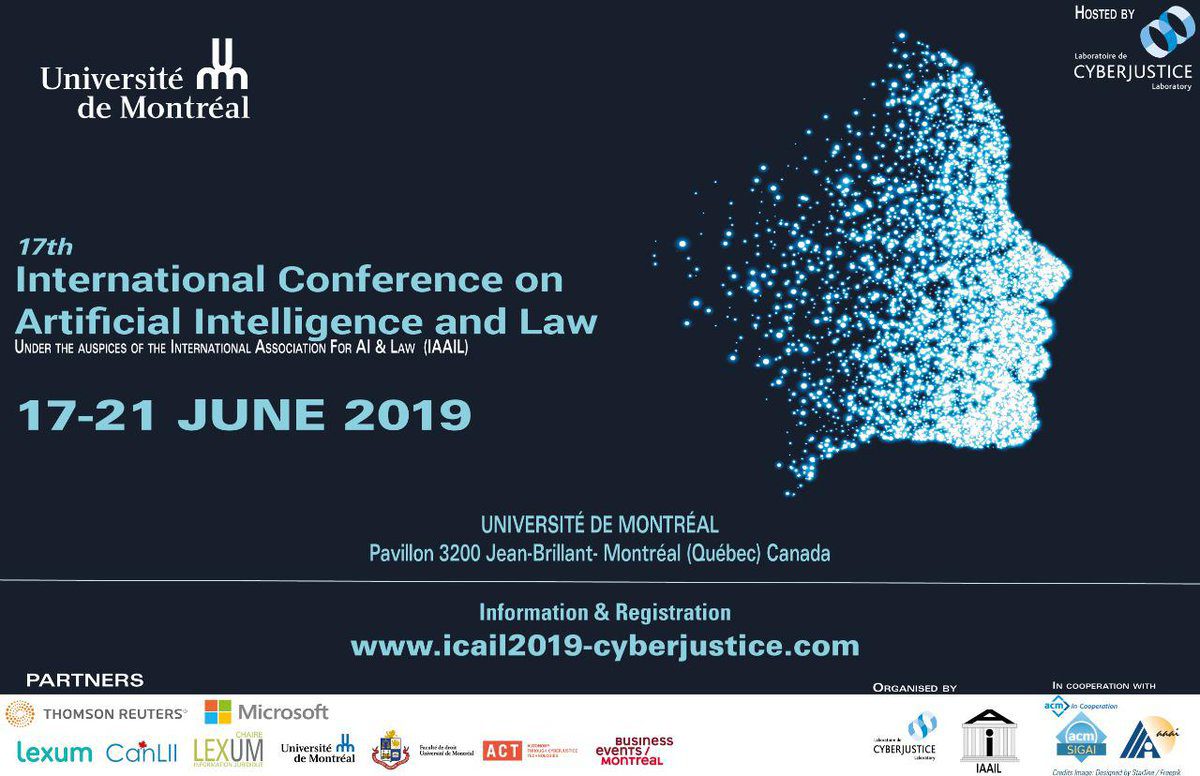Floris Bex – Information and Computing Sciences (Utrecht University) & Institute for Law, Society and Technology (Tilburg University), The Netherlands
This piece reports on the 2019 ICAIL conference, which was held at the Cyberjustice Laboratory of the University of Montreal, Canada in June of 2019.
For more than three decades the ICAIL conferences have been held biennially under the auspices of the International Association for Artificial Intelligence and Law (IAAIL), from the height of legal expert systems in the eighties through the AI winter into today’s deep-learning revolution. The 2019 edition, which ran from June 17-21, took place at the Cyberjustice Laboratory of the University of Montreal, Canada. For this edition, we had 86 full paper submissions, 17 of which (~20%) were selected for publication as full papers, 15 as extended research abstracts (~17%), and 8 as poster abstracts, which together with the 5 submitted demo abstracts makes for 13 short abstracts. Almost 300 people from 27 different countries and different backgrounds (law, computer science, AI) attended the conference or one of the 10 tutorials and workshops on a wide range of topics from defeasible logic for normative reasoning to automated extraction of information from legal texts. The objective of ICAIL has always been to be an inclusive rather than exclusive conference, and almost half of the authors who submitted were given the chance to present their work at the conference, which also hosted a Doctoral Consortium and a Mentoring Program aimed at helping young and new researchers enter the ICAIL community.
One of the strengths of the research presented at ICAIL, and the AI & Law community in general, has been that it is truly interdisciplinary and never overly reliant on one technique or approach. The number of topics has steadily grown in accordance with the developments in the wider field of Artificial Intelligence: logic and argument have been joined by statistical methods and data, knowledge engineering has been enriched with machine learning, and there are working applications as well as discussions on the legal and ethical issues of AI. But unlike in general AI, the field is not dominated by research on machine learning, simply because our domain, the law, is too complex and the tasks we expect our AI to perform are too important – translating a webpage is not the same as translating a contract.
The varied and interdisciplinary character of AI & Law showed in our invited speakers. Yoshua Bengio, co-recipient of the 2018 ACM A.M. Turing Award, spoke about the deep neural networks that have made the recent advances in AI possible, Pim Haselager presented his unique work on the psychology of interacting with such advanced AI, and IAAIL president Bart Verheij discussed what AI and the law can learn from each other in the age of deep learning. The papers receiving Best Paper awards were also varied: Marco Almada received the Best Student Paper award for his legal design oriented paper “Human intervention in automated decision-making”; Songül Tolan et al. received the Best Paper award for their paper “Why Machine Learning May Lead to Unfairness: Evidence from Risk Assessment for Juvenile Justice in Catalonia” on bias and unfairness in predictive machine learning, and Karl Branting et al. received the Best Innovative Application award for their paper “Semi-Supervised Methods for Explainable Legal Prediction”.
ICAIL 2019 was organised by Karim Benyekhlef (general chair), Floris Bex (program chair) and Michał Araszkiewicz (Doctoral Consortium and Mentoring Chair). All papers are included in the proceedings, which have been published by ACM (ISBN 978-1-4503-6754-7)
